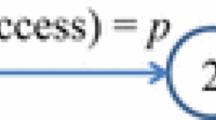Abstract
In this paper, we address a fundamental problem concerning the best flooding strategy to minimize cost and latency for target discovery in wireless networks. Should we flood the network only once to search for the target, or should we apply a so-called “expansion ring” mechanism to reduce the cost? If the “expansion ring” mechanism is better in terms of the average cost, how many rings should there be and what should be the radius of each ring? We separate wireless networks based on network scale and explore these questions. We prove that two-ring and three-ring schemes can reduce the cost of flooding compared to a single attempt, and we provide a general formula to determine good parameters for the two-ring and three-ring hop-based flooding schemes. Through simulations, we show that choosing flooding parameters according to our techniques gives performance close to that of ideal flooding schemes. Afterwards, we extend our work from the single target discovery problem to the multi-target discovery problem. We show that a properly chosen searching radius can save much more searching cost than a simple radius selection scheme for multi-target discovery problems.
Similar content being viewed by others
Abbreviations
- EXP:
-
EXPansion ring scheme
- DSR:
-
Dynamic Source Routing
- AODV:
-
Ad hoc On-Demand Distance Vector routing
References
D. Braginsky and D. Estrin, Rumor routing algorithm for sensor networks, in: Proc. International Conference on Distributed Computing Systems (ICDCS-22) (2002).
N. Bulusu, J. Heidemann and D. Estrin, Adaptive beacon placement, in: Proceedings of the 21st International Conference on Distributed Computing Systems (ICDCS-21), Phoenix, Arizona, USA (April 2001) pp. 489–498.
Z. Cheng and W. Heinzelman, Flooding strategy for target discovery in wireless networks, in: Proc. of the 8th International Workshop on Modeling Analysis and Simulation of Wireless and Mobile Systems (MSWIM 2003) (Sept. 2003).
Gnutella peer-to-peer file sharing system. http://www.gnutella.com.
Y.-C. Hu and D.B. Johnson, Caching strategies in on-demand routing protocols for wireless networks, in: Proc. ACM/IEEE MobiCom (Aug. 2000) pp. 231–242.
Y.-C. Hu and D.B. Johnson, Ensuring cache freshness in on-demand ad hoc network routing protocols, in: Proc. POMC 2002 Workshop on Principles of Mobile Computing, ACM, Toulouse, France (October 2002) pp. 25–30.
C. Intanagonwiwat, R. Govindan and D. Estrin, Directed diffusion: A scalable and robust communication paradigm for sensor networks, Mobile Computing and Networking (2000) pp. 56–67.
D.B. Johnson and D.A. Maltz, Mobile Computing, Chapter Dynamic source routing in ad hoc wireless networks, pp. 153–181. Kluwer Academic Publishers, Imielinski and Korth edition, 1996.
M.K. Marina and S.R. Das, Performance of route caching strategies in dynamic source routing, in: Proc. the Int’l Workshop on Wireless Networks and Mobile Computing (WNMC) in Conjunction with Int’l Conf. on Distributed Computing Systems (ICDCS) (2001) pp. 425–432.
D.L. Mills, Network Time Protocol (Version 3), RFC (Request For Comments) 1305 (March, 1992).
T. Oates, M.V. Nagendra Prasad and V.R. Lesser, Cooperative information gathering: A distributed problem solving approach, Computer Science Technical Report 94-66-version 2, University of Massachusetts, Amherst, MA.
C. Perkins and E.M. Royer, Ad hoc on-demand distance vector routing, in: Proceedings of IEEE WMCSA’99 (Feb. 1999) pp. 90–100.
M. Roman, C.K. Hess, R. Cerqueira, A. Ranganathan, R.H. Campell and K. Nahstedt, Gaia: A middleware infrastructure to enable active spaces, IEEE Pervasive Computing (Oct-Dec, 2002) pp. 74–83.
N. Sadagopan, B. Krishnamachari and A. Helmy, Active query forwarding in sensor networks (ACQUIRE), Computer Engineering Technical Report CENG 02-11 (2002).
Sun Mircorsystems, System and Netowrk Administration (March, 1990).
E. Woodrow and W. Heinzelman, SPIN-IT: A data centric routing protocol for image retrieval in wireless networks, Proc. International Conference on Image Processing (ICIP ‘02) (Sep, 2002).
T. Wu, M. Malkin and D. Boneh, Building intrusion tolerant application. in: Proc. of the 8th USENIX Security Symposium (1999).
Y. Xu, J. Heidemann and D. Estrin, Geography-informed energy conservation for ad hoc routing, in: Proc. Seventh Annual ACM/IEEE International Conference on Mobile Computing and Networking, Rome, Italy (July, 2001).
Author information
Authors and Affiliations
Additional information
Zhao Cheng is a PHD. candidate in the Department of Electrical and Computer Engineering at the University of Rochester. He received a B.S. degree in Radio Engineering from Southeast University, China in 2000 and M.S. degree in Electrical and Computer Engineering from University of Rochester in 2003. His current research interests lie in the areas of sensor networks, quality of service (QoS) and reliability for mobile ad-hoc networks, and efficient discovery strategies for mobile ad-hoc networks.
Wendi Heinzelman is an assistant professor in the Department of Electrical and Computer Engineering at the University of Rochester. She received a B.S. degree in Electrical Engineering from Cornell University in 1995 and M.S. and Ph.D. degrees in Electrical Engineering and Computer Science from MIT in 1997 and 2000, respectively. Her current research interests lie in the areas of sensor networks, quality of service (QoS) and reliability for mobile ad-hoc networks, and multimedia communication. She is a member of Sigma Xi, the IEEE, and the ACM.
Rights and permissions
About this article
Cite this article
Cheng, Z., Heinzelman, W.B. Flooding Strategy for Target Discovery in Wireless Networks. Wireless Netw 11, 607–618 (2005). https://doi.org/10.1007/s11276-005-3516-7
Issue Date:
DOI: https://doi.org/10.1007/s11276-005-3516-7




